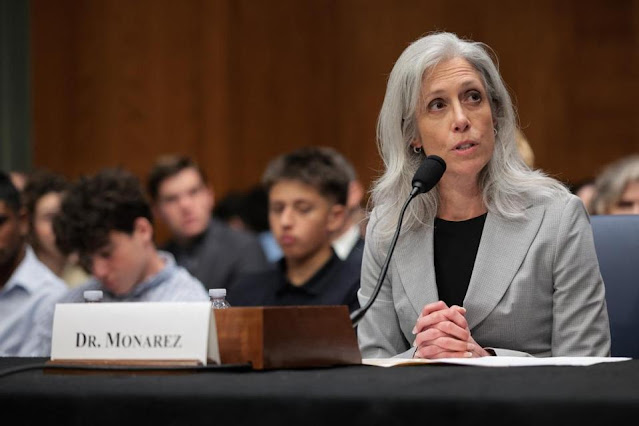In a dramatic escalation of tensions within the U.S. public health sector, the Trump administration has confirmed the termination of Susan Monarez as the head of the Centers for Disease Control and Prevention (CDC). The decision, announced on the social media platform X by the Department of Health and Human Services (HHS), follows a contentious standoff between Monarez and Health Secretary Robert F. Kennedy Jr. over sweeping and controversial changes to the nation’s vaccine policy. Monarez, a respected health scientist and longtime civil servant, had served as CDC director for less than a month before her abrupt dismissal, sparking a firestorm of criticism, resignations, and accusations of political interference in public health. This article delves into the events leading to Monarez’s ousting, the broader implications for the CDC, and the polarized debate surrounding vaccine policy in the United States.
The Announcement and the Controversy
The Department of Health and Human Services took to X to announce that Susan Monarez “is no longer director” of the CDC, a move that caught many in the public health community by surprise. Monarez, who was appointed to the role with Senate confirmation and sworn in by Kennedy on July 31, 2025, had been at the helm of the agency for a mere 26 days. The announcement came amid reports of a heated dispute between Monarez and Kennedy, centered on the latter’s aggressive push to overhaul U.S. vaccine policy. According to sources cited by The Washington Post, Kennedy had pressured Monarez to resign after she refused to endorse his proposed changes, which included restricting access to Covid-19 vaccines, dismissing immunization experts, and slashing funding for new vaccine development.
Monarez’s legal team quickly contested the administration’s actions, asserting that she had neither resigned nor received formal notification of her termination from the White House. In a statement, her lawyers declared, “She was notified tonight by a White House staffer in the personnel office that she was fired. As a presidential appointee, Senate-confirmed officer, only the president himself can fire her. For this reason, we reject the notification Dr. Monarez has received as legally deficient, and she remains as CDC Director.” They further accused Kennedy of “weaponizing public health for political gain and putting millions of American lives at risk,” a charge that has resonated with many in the scientific and public health communities.
The White House, however, was quick to counter these claims. Spokesman Kush Desai issued a statement clarifying the administration’s position: “As her attorney’s statement makes abundantly clear, Susan Monarez is not aligned with the President’s agenda of Making America Healthy Again. Since Susan Monarez refused to resign despite informing HHS leadership of her intent to do so, the White House has terminated Monarez from her position with the CDC.” This assertion that Monarez had signaled an intent to resign was met with skepticism by her legal team, who maintained that no such intention was ever communicated.
A Wave of Resignations
The fallout from Monarez’s dismissal was swift and far-reaching. Within days of the announcement, five senior CDC officials resigned in protest, citing concerns over the politicization of the agency and the erosion of its scientific integrity. Among those who stepped down were Demetre Daskalakis, director of the CDC’s National Center for Immunization and Respiratory Diseases, Debra Houry, the agency’s chief medical officer, and Daniel Jernigan, director of the National Center for Emerging and Zoonotic Infectious Diseases. Their resignations sent shockwaves through the public health community, as these individuals were widely regarded as pillars of expertise and leadership within the CDC.
Daskalakis, in particular, was vocal in his criticism of the administration’s actions. In a post on X, he wrote, “Enough is enough. I am unable to serve in an environment that treats CDC as a tool to generate policies and materials that do not reflect scientific reality and are designed to hurt rather than to improve the public’s health.” His words echoed the sentiments of many within the agency, who felt that the CDC’s mission to protect public health was being undermined by political pressures.
The American Federation of Government Employees (AFGE) Local 2883, which represents over 2,000 CDC employees, issued a statement expressing solidarity with the departing officials. “Many felt forced to walk away from the jobs they loved because politics left them no choice,” the union said. “Vaccines save lives.” This assertion reflects a broader concern among public health professionals that the administration’s policies, particularly those spearheaded by Kennedy, are jeopardizing decades of progress in immunization and disease prevention.
Kennedy’s Controversial Reforms
At the heart of the crisis is Health Secretary Robert F. Kennedy Jr., whose tenure has been marked by a series of polarizing decisions on vaccine policy. Since taking office, Kennedy has pursued an agenda that critics argue prioritizes political ideology over scientific evidence. Among his most controversial moves are the dismissal of key immunization experts, restrictions on access to Covid-19 vaccines, and significant cuts to funding for new vaccine development. These policies have drawn sharp criticism from the scientific community, with many warning that they could have devastating consequences for public health.
Kennedy, a longtime skeptic of vaccines, has argued that his reforms are necessary to address what he describes as systemic flaws in the U.S. public health system. He has claimed that vaccines, particularly those for Covid-19, have been inadequately tested and pose significant risks to the population. These claims have been widely debunked by scientists, who point to extensive research demonstrating the safety and efficacy of vaccines. Nevertheless, Kennedy’s rhetoric has found a receptive audience among certain segments of the population, particularly those who are distrustful of government institutions.
The changes implemented by Kennedy have already had tangible effects on the CDC’s operations. The agency, which is headquartered in Atlanta, Georgia, has long been a global leader in public health research and policy. However, under Kennedy’s leadership, it has faced unprecedented challenges, including a loss of morale among staff and a decline in public trust. The recent armed attack on the CDC’s headquarters, carried out by an individual who reportedly blamed the Covid-19 vaccine for an illness, has further heightened tensions and underscored the volatile atmosphere surrounding the agency.
The Open Letter and Public Backlash
In the wake of Monarez’s dismissal and the subsequent resignations, hundreds of current and former CDC employees signed an open letter accusing Kennedy of spreading misinformation and undermining public health. The letter, which was circulated widely on social media and covered by major news outlets, declared, “Public health is under attack.” It criticized Kennedy’s policies as reckless and warned that they could lead to a resurgence of preventable diseases.
The letter also called for greater transparency and accountability within the HHS and the broader administration. “The CDC has long been a beacon of scientific excellence and impartiality,” the letter stated. “To see it reduced to a political pawn is heartbreaking and dangerous.” The signatories, who included some of the nation’s leading public health experts, urged policymakers to prioritize evidence-based decision-making and to restore the agency’s autonomy.
The public response to the crisis has been deeply divided. Supporters of the Trump administration argue that Kennedy’s reforms are a necessary corrective to what they see as an overreaching and corrupt public health establishment. They point to anecdotal reports of vaccine side effects and distrust in pharmaceutical companies as justification for the administration’s actions. Critics, however, argue that these policies are based on misinformation and pose a significant threat to public health. They cite decades of data showing that vaccines have saved millions of lives by preventing diseases such as measles, polio, and smallpox.
The Legal and Political Implications
Monarez’s dismissal raises significant legal and political questions. As a Senate-confirmed presidential appointee, Monarez’s position is protected by certain procedural safeguards. Her lawyers argue that only the president has the authority to fire her, and they have characterized the White House’s actions as legally deficient. This dispute could potentially lead to a legal battle, with Monarez’s team seeking to challenge her termination in court.
The political implications of the crisis are equally significant. The CDC has long been a trusted institution, both in the United States and globally. Its role in responding to public health emergencies, from pandemics to natural disasters, is critical. The current turmoil threatens to undermine the agency’s ability to carry out its mission effectively, particularly at a time when public health challenges such as emerging infectious diseases and antimicrobial resistance are on the rise.
Moreover, the resignations of senior officials could have a ripple effect throughout the agency. The loss of experienced leadership may hamper the CDC’s ability to respond to crises, conduct research, and maintain its reputation as a global leader in public health. The union’s statement about employees feeling “forced to walk away” suggests that morale within the agency is at an all-time low, which could lead to further departures in the coming months.
The Broader Context: Vaccines and Public Trust
The controversy surrounding Monarez’s dismissal and Kennedy’s vaccine policies must be understood within the broader context of public trust in institutions. The Covid-19 pandemic exposed deep divisions in American society, with vaccines becoming a flashpoint in the culture wars. While the vast majority of scientists and public health officials support vaccination as a cornerstone of disease prevention, a vocal minority has raised concerns about vaccine safety and government overreach.
Kennedy’s appointment as Health Secretary was seen by many as a signal that the Trump administration intended to cater to this minority. His long history of vaccine skepticism, including his leadership of the Children’s Health Defense organization, made him a polarizing figure even before he took office. Critics argue that his policies are not only scientifically unfounded but also dangerous, as they could lead to lower vaccination rates and a resurgence of preventable diseases.
The CDC’s role in this debate is particularly significant. As the nation’s leading public health agency, it is responsible for providing clear, evidence-based guidance to the public. The current crisis threatens to erode public confidence in the agency, which could have long-term consequences for its ability to carry out its mission. The open letter from CDC employees underscores this concern, warning that “public health is under attack” at a time when it is needed most.
The Path Forward
As the dust settles on Monarez’s dismissal, the future of the CDC remains uncertain. The agency is now without a permanent director, and the resignations of senior officials have left significant gaps in leadership. The Trump administration will need to move quickly to appoint a new director who can restore stability and rebuild trust within the agency and the broader public.
However, the administration’s broader agenda, as articulated by Kennedy and other officials, suggests that significant changes to public health policy are likely to continue. The “Making America Healthy Again” initiative, which Desai referenced in his statement, appears to prioritize alternative approaches to health and wellness over established practices such as vaccination. Whether this agenda can be reconciled with the CDC’s mission to protect public health remains an open question.
For Monarez, the fight is far from over. Her legal team has signaled its intent to challenge her termination, arguing that the White House’s actions violate established protocols for presidential appointees. The outcome of this legal battle could set important precedents for the treatment of Senate-confirmed officials and the balance of power between the executive branch and independent agencies.
In the meantime, the public health community is grappling with the implications of the crisis. The resignations of senior officials and the open letter from CDC employees reflect a deep sense of unease about the direction of U.S. public health policy. For many, the dismissal of Monarez is not just a personnel decision but a symbol of a broader assault on science and evidence-based policymaking.
Conclusion
The sack of Susan Monarez as CDC director marks a pivotal moment in the ongoing debate over public health in the United States. Her brief tenure, marked by a clash with Health Secretary Robert F. Kennedy Jr. over vaccine policy, has exposed deep fault lines within the Trump administration and the public health community. The resignations of senior officials, the open letter from CDC employees, and the legal challenge mounted by Monarez’s team all point to a broader crisis of confidence in the nation’s public health infrastructure.
As the United States navigates this turbulent period, the stakes could not be higher. The CDC’s ability to respond to emerging threats, from infectious diseases to bioterrorism, depends on its credibility and the expertise of its staff. The current turmoil threatens to undermine both, with potentially devastating consequences for public health. The coming months will be critical in determining whether the agency can regain its footing and continue its vital work in protecting the health of the American people. For now, the nation watches as the fallout from Monarez’s dismissal continues to unfold, with the future of public health hanging in the balance.






